Conistone
Conistone is a small village in the Craven district of North Yorkshire, England. It lies 3 miles (5 km) north of Grassington, 3 miles (5 km) south of Kettlewell and 12 miles (19 km) north of Skipton beside the River Wharfe, in Upper Wharfedale.[1]
| Conistone | |
|---|---|
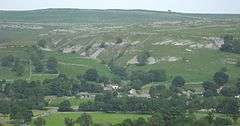 Conistone, bridge and Dib, over Wharfedale from west | |
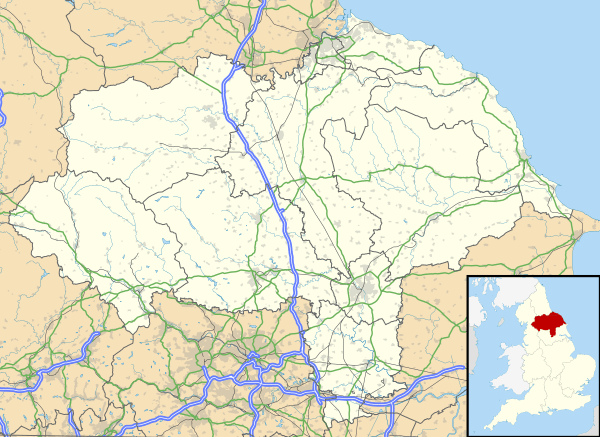 Conistone Location within North Yorkshire | |
| OS grid reference | SD981675 |
| Civil parish | |
| District | |
| Shire county | |
| Region | |
| Country | England |
| Sovereign state | United Kingdom |
| Post town | SKIPTON |
| Postcode district | BD23 |
| Dialling code | 01756 |
| Police | North Yorkshire |
| Fire | North Yorkshire |
| Ambulance | Yorkshire |
| UK Parliament | |
History
Conistone is mentioned in the Domesday Book as Cunestune and belonging to Ketil.[2] The name derives from a mix of Old Danish (Kunung) and Old English (tūn), which means King's farm or Settlement.[3]
The village is set in characteristic limestone scenery, including Mossdale Caverns, the dry gorge of Conistone Dib and the limestone outcrop of Conistone Pie.[4] Above the Dib the Dales Way path connects Kettlewell, to its north, and Grassington, to its south, providing distant views over Wharfedale.[5] From the B6160 road, the Wharfe is crossed at Conistone by a stone-arch bridge,[6] which is within easy walking distance of Kilnsey, with its Crag.
The parish church, St Mary's Church, dates from the 11th or 12th century, and is a Grade II listed building.[7]
Conistone was historically in the large ancient parish of Burnsall, in Staincliffe Wapentake in the West Riding of Yorkshire.[8] It became part of the civil parish of Conistone with Kilnsey in 1866,[9] and was transferred to North Yorkshire in 1974. The population of the parish in the 2001 census was 117,[10] rising to 124 at the 2011 census.[11] In 2015, North Yorkshire County Council had estimated the population to be 110.[12]
Immediately to the east of the village lies Conistone Moor and Riggs Moor. The moorland here was known for its lead mines,[13] and also as being the furthest point in England from a road. Known by the Ordnance Survey as Pile of Stones, the point is on Riggs Moor and is found at 54.1427°N 1.9585°W, SE03287183.[14]
Gallery
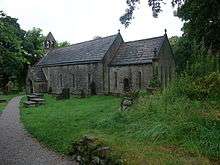 St Mary's Church, Conistone, from the south-east
St Mary's Church, Conistone, from the south-east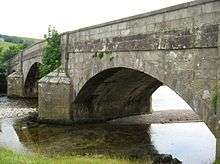 Stone arch bridge over Wharfe
Stone arch bridge over Wharfe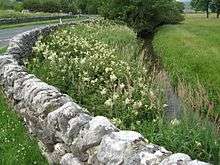 Meadowsweet along B6160, toward Kilnsey
Meadowsweet along B6160, toward Kilnsey Wall across Dib
Wall across Dib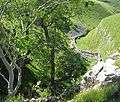 View down Dib from top, at Dales Way path
View down Dib from top, at Dales Way path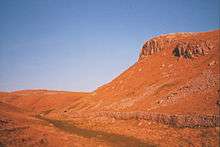 Conistone Dib
Conistone Dib
References
- "Genuki: In 1822, the following places were in the Parish of Burnsall:, Yorkshire (West Riding)". www.genuki.org.uk. Retrieved 6 January 2020.
- "Conistone | Domesday Book". opendomesday.org. Retrieved 6 January 2020.
- Ekwall, Eilert (1960). The concise Oxford dictionary of English place-names (4 ed.). Oxford: Oxford University Press. p. 120. ISBN 0-19-869103-3.
- Machell, Ben (22 May 2009). "Times Walks: Kettlewell and Conistone Moor, North Yorkshire". The Times. Retrieved 6 January 2020.
- "Weekend Walk. Conistone Dib". The Yorkshire Post. 7 October 2017. Retrieved 6 January 2020.
- Historic England. "Conistone Bridge over River Wharfe (Grade II) (1316801)". National Heritage List for England. Retrieved 6 January 2020.
- Historic England. "Church of St Mary (1296267)". National Heritage List for England. Retrieved 21 June 2015.
- "Places in the Parish of Burnsall in 1822". GENUKI. Retrieved 12 June 2013.
- "Conistone With Kilnsey CP/Ch". Vision of Britain. Retrieved 12 June 2013.
- UK Census (2001). "Local Area Report – Conistone with Kilnsey Parish (36UB020)". Nomis. Office for National Statistics. Retrieved 6 January 2020.
- UK Census (2011). "Local Area Report – Conistone with Kilnsey Parish (E04007073)". Nomis. Office for National Statistics. Retrieved 6 January 2020.
- "2015 Population Estimates Parishes" (PDF). northyorks.gov.uk. December 2016. p. 10. Retrieved 6 January 2020.
- "The Yorkshire Moors and Fells" (PDF). yorkshiredales.org.uk. p. 2. Retrieved 6 January 2020.
- Hellen, Nicholas (26 May 2019). "The end of Britain's wilderness: nowhere is more than 6 miles from a road". The Sunday Times. Retrieved 6 January 2020.
External links
| Wikimedia Commons has media related to Conistone. |